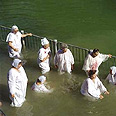
Every year before drafting the Tourism Ministry's budget, the tourism industry asks for extra budget for marketing Israel abroad as a tourist hot spot. Marketing, according to them, is the most important issue in tourism, and, therefore, it follows that it should be large-scale and consistent.
For three years, the tourism industry has been placing the requisite sum for a marketing budget at NIS 360 million (about $95 million) citing that even consulting firm Ernst and Young has indicated this figure as the minimum necessary for keeping Israel on the global tourism map.
However, in the same breath, people in the tourism field explain that a large marketing budget is not enough. A serious and targeted marketing plan is needed as well, and this, they claim, can only be drafted through industry-wide cooperation, mainly through establishing a national tourism authority instead of being relegated to just a department or wing within the ministry.
Israel's tourism industry leaders already contacted the Tourism Ministry, the Finance Ministry, and the prime minister a number of years ago with a proposal to establish a national tourism authority. "Many countries have a national tourism authority, and Israel is one of the only countries in which the issue of tourism marketing is left in the hands of a government ministry," explained Israel Hotel Association President Eli Gonen.
The reasoning behind the demand is that while the tourism minister will act as the chairman of the authority, it will be a professional body whose members will be people who work in tourism. The members will give reports on the results of actions taken by the body, in other words, whether incoming tourism has increased.
"Such a body will need to recruit the best experts in Israel and the world for marketing efforts, to ensure that the weight of tourism in the national economy receives fair representation," explained Gonen.
Many transportation ministers have tried selling the Israeli public the idea of "open skies" that allow many airline companies – both Israeli and foreign – to operate a number of flights in order to increase competition. In reality, the open skies policy exists only on paper, without any real competition.
Prices of flights from Israel are high, and flights to Israel are even higher. It is no surprise that many tourists prefer not to come to Israel. Israel, for them, is an expensive tourist destination. And not just in comparison with its neighbors.
A billion Chinese are wrong
In order to show the absurdity of what has been going on in recent years in regards to the country's marketing expenditures, industry people point to the decision to turn Bar Refaeli into a brand that will bring tourists to Israel. With all due respect to Refaeli, choosing her to represent Israel's tourism off the mark. No celebrity has yet to exist who could make people visit a certain country just because he or she lives there.
Furthermore, a short time after this misguided decision, the Tourism Ministry decided to market Israel at Arsenal Stadium in London. Signs enticing the public to visit Israel were hung in the stadium. The cost of the deal struck between the Tourism Ministry and the prestigious soccer club was hundreds of thousands of dollars, which ultimately went down the drain. About a year later, the ministry admitted that the move did not enhance tourism to Israel. Or, in other words: it was a failure.

Ad published in France promoting Israeli tourism
The decision to focus on new, undeveloped markets also seems absurd to tourism industry professionals. A few years ago, the Tourism Ministry decided to set its sights on China, and even held a special seminar with representatives from the Chinese embassy in order to bring the Chinese tourists to Israel, even though China had marked Israel as a "preferred site" for tourism. The Tourism Ministry jumped on their supposed find and already saw masses of Chinese tourists flooding Israel in their dreams.
Beyond the fact that Ernst and Young reported that China is not a country to be focused on, the decision to go the Chinese route was made without consulting with people in the tourism industry. The industry explained that Israel is not properly prepared to absorb tourists from China. There aren't enough seats on planes; there aren't Chinese-speaking hotels, and only now is the first course for tour guides for Chinese tourists finishing up.
Sure enough, 5,349 Chinese arrived between the months of January and August, a 38% decrease in comparison with January to August 2008. Most likely, a large number of the Chinese people arriving during this time were foreign workers, not tourists.
Another problem with the Tourism Ministry's marketing budget is its focus on populations that do not need any additional push to come visit Israel. Tourism ministers in recent years have focused marketing efforts on a Jewish audience and a religious Christian audience. The Jewish target audience does not justify the marketing efforts because it will come to Israel one way or another. Focusing on evangelical Christians is a strategic mistake because in being an extreme religious target group, they push out other groups that may be have otherwise been open to visiting Israel with a little convincing.
"If you want to increase the number of tourists coming to Israel to five million, it is a mistake to focus on the extremes. We must focus on general tourism, in other words, on independent tourism that does not belong to various sects and comes to Israel because of what it has to offer," explained Israel Incoming Tour Operators Association Director Ami Etgar.
"We need to focus on tourism that perhaps has a religious orientation, but that comes to Israel to tour the country, to sit in coffee shops, and visit museums," Etgar explained.
A day trip
In order to demonstrate how much Israel's tourism marketing doesn't fit the bill when it comes to targeting religious tourism, it is a fruitful exercise to see exactly what happened after the pope's visit in 2000 and what happened after the pope's visit this year.
Prior to 2000, everyone was convinced that the pope's visit would be followed by an influx of believers coming to see the country's holy sites. Tens of thousands. Hundreds of thousands. Even millions. The numbers thrown about were anywhere between six and 15 million tourists. Ultimately, the year closed with three million incoming tourists visiting Israel.

Marketing Israel in eastern Europe. A good idea
Neither did the recent pope's visit in 2009 cause a big to-do. Sure, you can always blame the financial crisis or the war in Gaza. But the land of Israel is the Holy Land for Christians. So, how does this add up with the fact that Catholic countries like Spain, Portugal, and Italy all have decreased in their representation among tourists coming to Israel since the beginning of the year. Spain has declined 25%, Portugal by 45%, and Italy by 11%.
In the past year, the Tourism Ministry invested in widespread marketing of Israel to eastern Europe, especially to the Russian market, a step that has proven itself very clever. "Look what is happening with this market," said Etgar.
"When there were still problems with their visas, these people would come to Israel for a day trip. They would leave early in the morning on a bus from Sharm el-Sheikh, stand hours at the border, and spend a packed day in Israel.
"On such day trip, they would go to the Dead Sea, the Christian sites in Jerusalem, and for shopping in Tel Aviv. And they were really satisfied. Now the goal is to bring them here for a longer period because these are tourists that invest and know how to enjoy their vacation," explained Etgar.
Tasteless marketing: condoms
The next case is of an incident of bad taste being employed in the manner in which someone decided to market Israel, or at least Tel Aviv.
Four months ago, a marketing event was held in London by the Tourism Ministry and was attended by representatives of the Israel Hotel Association, El-Al, and Tel Aviv's tourism association. Dozens of British travel agents were invited to the event in order to present them with special travel packages to Israel, namely weekend packages in Tel Aviv.
At the end of the event, decorated gift boxes from one of the Dead Sea's cosmetic companies were distributed to the tourist agents as they left the hall. Written on the boxes was the inscription: visit-tel-aviv@come.
According to some of the participants, those distributing the gift packages told them "Come to Tel Aviv and be satisfied." When they opened the boxes, they were surprised to find a box full of condoms.
"We worked so hard to bring all the British travel agents here, some of them religious Jews. This incident with the condoms, which borders on the tasteless and the crass, ruined the whole event," said on of the participants.















